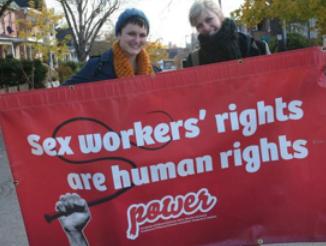Representatives for Vancouver sex workers argued before the Supreme Court of Canada on Jan 19 that a constitutional challenge to Canada’s sex work laws should be allowed to proceed.
The Court must now decide whether the Downtown Eastside Sex Workers United Against Violence (SWUAV) meet the legal requirements for representation in the case, called public interest standing.
The federal government has challenged the case, arguing that the sex workers do not meet the criteria for public interest standing.
Sheryl Kiselbach, the only plaintiff in the case, is optimistic.
“I’m feeling hopeful that the judges understand more of the issues,” she says. “[Changing the laws] will stop the fear of the police. It will also send a message out to the predators.”
The legal test for public interest standing involves three considerations: that the issue is a serious one, that there is no other reasonable or effective way for the issue to come before the court, and that those behind the case are directly affected by it.
It is the third point, as well as the overall flexibility of the test, that is at issue because Kiselbach has not been charged with the offences in question — a standard expectation in any constitutional challenge. She is also no longer a sex worker, which is problematic because it can be argued that her rights can only be deprived if she is pursuing sex work.
However, Vancouver lawyer Joseph Arvay, who spoke for SWUAV on Jan 19, indicated that the legal barriers and potential personal consequences facing street-level sex workers deter individuals from participating in such a challenge, leaving it up to groups like SWUAV to coordinate public interest cases. He said these consequences include fear of retaliation by police, invasion of privacy and child welfare actions.
“For them, this case is not about vindicating some abstract constitutional principle but, rather, to be able to carry on what is otherwise lawful, legal sex work in a manner that will not cause them grievous bodily harm or even death,” Arvay said during the proceedings. “Willy Pickton had his day in court; my clients want theirs, too.”
Ottawa lawyer Karin Galldin was in court as an observer.
“What we heard from the court is that they certainly understood SWUAV’s argument that street-level sex workers may not be in the best position to bring an effective individual challenge,” says Galldin, whose legal practice, Galldin Law, works with the Ottawa sex workers’ rights group POWER. “Though, the scope of the case goes beyond sex workers to groups who want to litigate on behalf of individuals. The issue for the court is whether we need a new test.”
Vancouver lawyer Katrina Pacey, who represents SWUAV along with Arvay and other lawyers at Pivot Legal Society, spoke at a rally following the proceedings. She gave a nod to the violence facing Ottawa sex workers, referencing a recent warning issued by the Ottawa Police Service about a pattern they had uncovered in six cases of murder involving sex workers going back 21 years.
“As far as I can tell, the federal government seems intent on maintaining Canada’s prostitution laws despite the incredible violence and rights violations that they create,” Pacey says. “The question is, how do we make sure that sex workers are safe?”
Pacey says Canada should adopt New Zealand’s model of decriminalization, which allows sex workers to shape their labour conditions and give input on how the industry is run.
In contrast, street-level sex workers in Canada are still at the mercy of police action, including street sweeps, excessive force and harassment.
POWER and other advocacy groups question why Ottawa police still engage in sex worker street sweeps despite knowing the dangers faced by sex workers, including a potential serial killer.
Furthermore, a 2010 Ontario Supreme Court ruling struck down several laws governing sex work. In the decision, which applies only in Ontario, Justice Susan Himel indicated that federal laws contribute to the danger faced by sex workers. The ruling is currently being appealed, with an Ontario Court of Appeals decision expected later this year.
“We know the consequences of these laws on sex workers’ lives,” says Frédérique Chabot, a member of POWER and the co-author of a recent POWER research report. “Because of the sweeps, women and men who do sex work, they don’t work in pairs, they’re displaced to isolated areas, they’ll [focus more] on avoiding arrest than screening clients.”

 Why you can trust Xtra
Why you can trust Xtra


